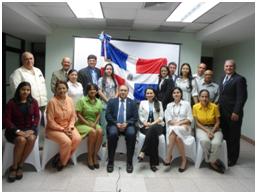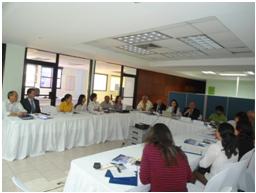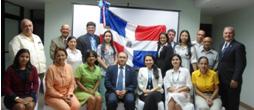The Dominican Republic is facing serious climate change related problems such as sea-level rise and more frequent and intensive extreme weather events. In order to strengthen human resource capacities to address these challenges, the Dominican Republic has commenced a UN CC:Learn supported project on Strengthening Human Resources and Skills to Address Climate Change. On 22 November 2011, the Dominican Republic’s National Council for Climate Change and the Clean Development Mechanism (CNCCMDL) organized a planning meeting with Government officials, members of the civil society and the private sector, as well as UN organizations with the objective to support the preparations for the project.

In his opening remarks Mr. Omar Ramirez Tejada, Vice-President of the CNCCMDL, highlighted the importance of the project to implement concrete action to strengthen human resources in the country to address climate change. He also expressed his hope that the project can be a model for other countries in the region. Ms. Adriana Valenzuela from the UN CC:Learn Secretariat highlighted the important role of the Dominican Republic in the international negotiations on Article 6 of the UNFCCC. This is an indication of the country’s commitment to training, education and public awareness and serves as a sound basis for the national UN CC:Learn project.

During the planning meeting participants defined the National Coordination Mechanism which includes 23 national agencies, organizations and networks. Some of the operational tasks will be led by a Sub-committee that includes the CNCCMDL, the Ministry of Education, the Ministry of Environment, INFOTEC, RENAEPA and FUNGLOBE. A major National Workshop that will bring together high-level representatives from key sectors and stakeholders was scheduled to take place on 2 February 2012. The main objective of the Workshop will be to create momentum for the development of a National Strategy to Strengthen Human Resources and Skills to Advance Green, Low Emission and Climate Resilient Development. Regarding the concrete action that will be implemented in the framework of the Strategy, participants highlighted that introducing climate change topics in training and education curricula, designing training materials and developing training of trainers approaches would certainly be among the priorities of the Dominican Republic.
The planning meeting also provided an opportunity for a working session on the UN CC:Learn project for CNCCMDL staff, and to meet bilaterally with different institutions, including the Ministry of Education, the Ministry of Environment, the Ministry of Youth, INFOTEC, FUNGLOBE, Santo Domingo municipality, local UN partners, and the media.
UN CC:Learn, is a collaboration of 30 UN agencies with the aim to strengthen human resources, learning and skills development in Member States through country driven processes. It is included in the “One UN Climate Change Action Framework” of the UN System Chief Executives Board for Coordination (CEB) through the High Level Committee on Programmes (HLCP).
UN CC:Learn pilot projects aim at supporting five countries, Benin, the Dominican Republic, Indonesia, Malawi and Uganda in taking a strategic and long-term approach to climate change learning with the ultimate goal to mainstream climate change learning within existing learning system. They are directly linked to, and make a contribution to the implementation of Article 6 of the UN Framework Convention on Climate Change (UNFCCC) and the UNFCCC Capacity Development Framework. They also apply the core principles of the Paris Declaration on Aid Effectiveness which emphasize country ownership, empowerment of national institutions, and alignment of support by development partners. The pilot implementation phase of UN CC:Learn in 2011-2013 is supported by the Swiss Development Cooperation (SDC).
For further information please contact [email protected] .

